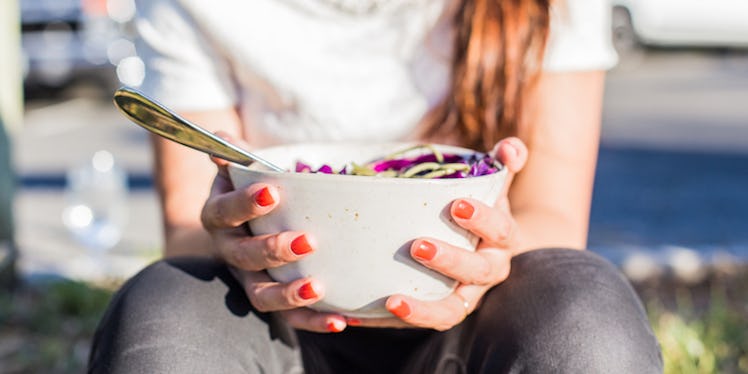
7 Simple Wellness Tips From Other Cultures To Help You Look Good For Summer
Americans are the crowned kings and queens of overeating, as the US is currently the most obese country in North America, and one of the most obese places in the world. About 78 million adults and 13 million children have a BMI over 30. That's about 35 percent of the US population.
The CDC points out that adults in the US are, on average, 26 pounds heavier than they were in the 1950s.
The solutions to our unhealthy lifestyles are out there -- we just have to be willing to experiment with what works well in other parts of the world.
1. Ride off those extra pounds.
When was the last time you rode your bike to work? Or maybe a better question to ask is, have you ever commuted to work on a bicycle?
For many other countries, bicycle commuting is a regular part of their day-to-day lives. And no other country does this quite like the Netherlands.
In the Netherlands, bicycling culture courses through its citizens' veins. The total population of the country is 16,652,800 and there are estimated to be 16.5 million bikes, meaning that 99.1 percent of people in the Netherlands own a bicycle. And of these bike owners, 36 percent of people there use their bicycles as a primary source of transportation.
Whenever possible, ride your bicycle instead of driving. The exercise will help keep off the pounds as well as saving you money on gas and saving the environment from the car emissions.
If you've never looked into it, check out how bicycle-friendly your city is.
2. Avoid ingredients other cultures have banned.
While the United States has its fair share of health care legislation designed to keep us healthy, we've missed the mark in terms of laws designed to keep dangerous foods out of diets.
An article on Eat Local Grown titled "10 American Foods that are Banned in Other Countries," points out toxic ingredients that are still allowed into our food in the United States.
The foods and additives listed have been banned in hundreds of countries around the globe. Sure, US health agencies have developed some laws designed to protect public well-being, but there needs to be more emphasis on banning foods that are toxic and harmful to consume over time. We should follow the lead of European Union on this food issue.
3. Give your water a makeover.
Aguas frescas is extremely popular in Mexico. These homemade flavored waters not only taste fresh and delicious, they are a natural way to promote staying hydrated. It's much easier to get your daily two liters when the water is flavored with fruits and herbs such as cucumber, lemon and hibiscus.
Thankfully, people in the U.S. are already taking note of this healthy water trend and cutting out the sodas and sugary drinks. Sassy water, the United States equivalent, has proven to help flatten tummies and keep bodies properly hydrated.
4. Rethink your utensils.
Kimiko Barber, author of the Chopsticks Diet, swears by the diet, saying, “In Japan, food is served in smaller portions and is designed to be eaten with chopsticks which slow you down, so you eat less.”
Studies have shown that eating with chopsticks can help you consume less food. If you can learn to master this skill, you'll not only look like a professional the next time you go on a sushi date, you'll lose pounds by slowing down.
5. Research other cultures' superfoods.
If you've never tried Ethiopian food before, do yourself a favor and search for Ethiopian places near you.
When you scout out and try Ethiopian food, you'll open up your mind to a new way of eating and your tastebuds will experience a new form of savory bliss.
The staple of this type of African food is a thin, handmade bread called injera, which is made of the superfood flour known as teff. Vegetables, lentils and beans, rice and minimal amounts of meat are served on top of injera.
Even in my small hometown in Idaho, we are lucky enough to have a world-class Ethiopian restaurant. If we have one, odds are you can find this uniquely sustainable cuisine somewhere near where you live.
6. View massages as a practice of health, not luxury.
What's considered a luxury in the U.S. is actually quite common in other parts of the world for improving physical health and mental health alike.
In Thailand, many people get regular massages as a means of staying healthy and fit. An article on prevention points out that “many studies have found that Thai massage can improve a wide variety of physical fitness measures, including flexibility, agility, speed and strength.”
7. Rethink your coffee addiction.
While coffee in small increments may have some health benefits, people in the US tend to go overboard and become full-blown addicts.
Drinking too much coffee can be a bad thing, and result in a host of negative side effects. Not to mention, there's all of the cream and sugar that Americans love to add into their morning concoctions.
Rather than overdoing it with coffee drinks, try an alternative like tea or maté!
People who live in countries in South America commonly drink maté, as it's proven to be have many health benefits due to its multitude of vitamins, minerals and antioxidants. Additionally, maté provides a clean boost of natural caffeine.
This much is certain: Those of us struggling with our weight will benefit from all the healthy eating tips we can get! In addition to making healthy eating choices, we should also take note of the ways in which other countries engrain exercise into their cultures.
Once we are willing to adopt the wonderful ways other people around the world stay healthy, we can change unhealthy habits at home for good.